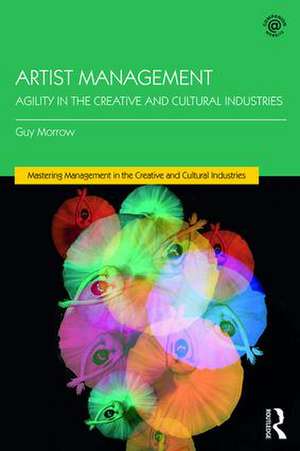Artist Management: Agility in the Creative and Cultural Industries: Discovering the Creative Industries
Autor Guy Morrowen Limba Engleză Paperback – 19 apr 2018
Artist Management: Agility in the Creative and Cultural Industries makes a major contribution to our understanding of the creative and cultural industries, of artistic and managerial creativities, and of social and cultural change in this sector. The book undertakes an extensive exploration of the increasingly pivotal role of artist managers in the creative and cultural industries and argues that agile management strategies are useful in this context. This book provides a comprehensive and accessible account of the artist–artist manager relationship in the twenty-first century. Drawing from research interviews conducted with artist managers and self-managed artists in five cities (New York, London, Toronto, Sydney and Melbourne), this book makes an original contribution to knowledge. Nation-specific case studies are highlighted as a means of illuminating various thematic concerns.
This unique book is a major piece of research and a valuable study aid for both undergraduate and postgraduate students of subjects including arts management, creative and cultural industries studies, arts entrepreneurship, business and management studies and media and communications.
| Toate formatele și edițiile | Preț | Express |
|---|---|---|
| Paperback (1) | 360.43 lei 6-8 săpt. | |
| Taylor & Francis – 19 apr 2018 | 360.43 lei 6-8 săpt. | |
| Hardback (1) | 999.46 lei 6-8 săpt. | |
| Taylor & Francis – 17 apr 2018 | 999.46 lei 6-8 săpt. |
Din seria Discovering the Creative Industries
-
 Preț: 402.78 lei
Preț: 402.78 lei -
 Preț: 298.36 lei
Preț: 298.36 lei -
 Preț: 245.95 lei
Preț: 245.95 lei -
 Preț: 277.97 lei
Preț: 277.97 lei -
 Preț: 347.42 lei
Preț: 347.42 lei -
 Preț: 311.56 lei
Preț: 311.56 lei -
 Preț: 403.94 lei
Preț: 403.94 lei - 8%
 Preț: 437.45 lei
Preț: 437.45 lei - 8%
 Preț: 383.18 lei
Preț: 383.18 lei -
 Preț: 310.65 lei
Preț: 310.65 lei -
 Preț: 283.61 lei
Preț: 283.61 lei -
 Preț: 318.66 lei
Preț: 318.66 lei -
 Preț: 357.57 lei
Preț: 357.57 lei - 8%
 Preț: 383.49 lei
Preț: 383.49 lei -
 Preț: 355.59 lei
Preț: 355.59 lei - 8%
 Preț: 488.03 lei
Preț: 488.03 lei -
 Preț: 326.63 lei
Preț: 326.63 lei -
 Preț: 311.76 lei
Preț: 311.76 lei -
 Preț: 362.43 lei
Preț: 362.43 lei -
 Preț: 374.94 lei
Preț: 374.94 lei -
 Preț: 365.87 lei
Preț: 365.87 lei -
 Preț: 477.45 lei
Preț: 477.45 lei - 18%
 Preț: 1115.84 lei
Preț: 1115.84 lei -
 Preț: 447.84 lei
Preț: 447.84 lei -
 Preț: 354.30 lei
Preț: 354.30 lei - 15%
 Preț: 441.12 lei
Preț: 441.12 lei -
 Preț: 434.63 lei
Preț: 434.63 lei -
 Preț: 389.38 lei
Preț: 389.38 lei
Preț: 360.43 lei
Nou
Puncte Express: 541
Preț estimativ în valută:
68.99€ • 74.96$ • 57.99£
68.99€ • 74.96$ • 57.99£
Carte tipărită la comandă
Livrare economică 21 aprilie-05 mai
Preluare comenzi: 021 569.72.76
Specificații
ISBN-13: 9781138697669
ISBN-10: 1138697664
Pagini: 146
Ilustrații: 3 Line drawings, black and white; 1 Tables, black and white; 3 Illustrations, black and white
Dimensiuni: 156 x 234 x 12 mm
Greutate: 0.23 kg
Ediția:1
Editura: Taylor & Francis
Colecția Routledge
Seria Discovering the Creative Industries
Locul publicării:Oxford, United Kingdom
ISBN-10: 1138697664
Pagini: 146
Ilustrații: 3 Line drawings, black and white; 1 Tables, black and white; 3 Illustrations, black and white
Dimensiuni: 156 x 234 x 12 mm
Greutate: 0.23 kg
Ediția:1
Editura: Taylor & Francis
Colecția Routledge
Seria Discovering the Creative Industries
Locul publicării:Oxford, United Kingdom
Public țintă
PostgraduateCuprins
Chapter 1: Introduction:
Artist management in the creative and cultural industries
1.1 The agile movement
1.2 Collaboration has a lifespan
1.3 Managing artistic contributions
1.4 What is artist management? Is it creative?
1.5 The artist–artist manager relationship
1.6 References
Chapter 2: Research design
2.1 Selection of industries, cases and participants
2.2 Methods
2.3 Outline of the book
Chapter 3: The artist’s career as startup:
Lean startup and effectuation methods for the arts
3.1 Extreme uncertainty: What is art?
3.2 Extreme uncertainty: Shaping a future for yourself
3.3 Conclusion: What good are the arts? How can we sell art?
Chapter 4: Agile management strategies
4.1 Artist management and the agile movement
4.2 Agility on individual and group levels
4.3 Case study: Agility in the dance sector
4.4 Case study: Agility in the film sector
4.5 Conclusion
Chapter 5: Storytelling in the creative and cultural industries:
Where is creativity? Creative cities and artist management
5.1 Storytelling in the creative and cultural industries
5.2 Sporting analogies
5.3 An artist manager’s checklist
5.4 Moving people to action
5.5 B2C and B2B storytelling
5.6 Storytelling etiquette
5.7 Case study: SXSW favours the storytellers
5.8 Destroying through narrative
5.9 Conclusion
Chapter 6: The artist-artist manager relationship:
Agile by default
6.1 The specificity of artist management labour
6.2 An informal approach to management
6.3 They found me with a gun in my hand
6.4 Double dipping
6.5 The bank account
6.6 Conclusion
Chapter 7: Conclusions: The future of artist management:
Artist’s voice, manager’s voice
7.1 The rapid escalation of complexity
7.2 Creativity: The key leadership competency for the future
7.3 Music case study 1: The Featured Artists’ Coalition
7.4 Music case study 2: The International Music Managers’ Forum
7.5 Judas Goat
7.6 Dance case study: ‘GoSeeDo’ and ‘Book a Flash Mob’
7.7 Creative and cultural industries case study: Culture Counts
7.8 Big data, automation and the future of work
7.9 References
Appendix A: The interviews
Appendix B: Association of Artist Managers Code of Conduct
Appendix C: Code of Conduct of MMF Australia
Index
Artist management in the creative and cultural industries
1.1 The agile movement
1.2 Collaboration has a lifespan
1.3 Managing artistic contributions
1.4 What is artist management? Is it creative?
1.5 The artist–artist manager relationship
1.6 References
Chapter 2: Research design
2.1 Selection of industries, cases and participants
2.2 Methods
2.3 Outline of the book
Chapter 3: The artist’s career as startup:
Lean startup and effectuation methods for the arts
3.1 Extreme uncertainty: What is art?
3.2 Extreme uncertainty: Shaping a future for yourself
3.3 Conclusion: What good are the arts? How can we sell art?
Chapter 4: Agile management strategies
4.1 Artist management and the agile movement
4.2 Agility on individual and group levels
4.3 Case study: Agility in the dance sector
4.4 Case study: Agility in the film sector
4.5 Conclusion
Chapter 5: Storytelling in the creative and cultural industries:
Where is creativity? Creative cities and artist management
5.1 Storytelling in the creative and cultural industries
5.2 Sporting analogies
5.3 An artist manager’s checklist
5.4 Moving people to action
5.5 B2C and B2B storytelling
5.6 Storytelling etiquette
5.7 Case study: SXSW favours the storytellers
5.8 Destroying through narrative
5.9 Conclusion
Chapter 6: The artist-artist manager relationship:
Agile by default
6.1 The specificity of artist management labour
6.2 An informal approach to management
6.3 They found me with a gun in my hand
6.4 Double dipping
6.5 The bank account
6.6 Conclusion
Chapter 7: Conclusions: The future of artist management:
Artist’s voice, manager’s voice
7.1 The rapid escalation of complexity
7.2 Creativity: The key leadership competency for the future
7.3 Music case study 1: The Featured Artists’ Coalition
7.4 Music case study 2: The International Music Managers’ Forum
7.5 Judas Goat
7.6 Dance case study: ‘GoSeeDo’ and ‘Book a Flash Mob’
7.7 Creative and cultural industries case study: Culture Counts
7.8 Big data, automation and the future of work
7.9 References
Appendix A: The interviews
Appendix B: Association of Artist Managers Code of Conduct
Appendix C: Code of Conduct of MMF Australia
Index
Recenzii
'Guy Morrow goes well beyond truisms such as "an artist is a start-up business" because he knows that such truisms don't sustain the various phases of any artistic career. Instead, his focus is on the value of agility amidst increasing complexity. Managers in every industry can learn from this.' — Catherine Moore, PhD, Adjunct Professor, University of Toronto, Canada
'Guy Morrow has had a fascinating career as an artist management ‘pracademic’ (i.e. both a practitioner and academic). This makes his work of particular relevance and interest to those of us seeking to bridge theory and practice.' — Paul Saintilan, CEO, Collarts and Macleay Colleges, Australia. Co-author of Managing Organizations in the Creative Economy: Organizational Behaviour for the Cultural Sector
'Artist Management offers a timely understanding of the manifold ways in which contemporary creative producers need to deal with uncertainty and career development. Incorporating the experiences of practitioners and the insights of contemporary scholarly work, Guy Morrow has crafted a highly engaging book.' — Dr. Erik Hitters, Associate Professor of Media and Creative Industries, Managing Director of the Erasmus Research Centre for Media, Communication and Culture, Erasmus University Rotterdam, Netherlands.
'This book opens up key concerns for theory and practice: how do contemporary practices such as agile management, lean start up and crowd-funding relate to the big questions of what are the arts and how should they be managed.' — Doris Ruth Eikhof, CAMEo Research Institute, University of Leicester, UK
'Guy Morrow has had a fascinating career as an artist management ‘pracademic’ (i.e. both a practitioner and academic). This makes his work of particular relevance and interest to those of us seeking to bridge theory and practice.' — Paul Saintilan, CEO, Collarts and Macleay Colleges, Australia. Co-author of Managing Organizations in the Creative Economy: Organizational Behaviour for the Cultural Sector
'Artist Management offers a timely understanding of the manifold ways in which contemporary creative producers need to deal with uncertainty and career development. Incorporating the experiences of practitioners and the insights of contemporary scholarly work, Guy Morrow has crafted a highly engaging book.' — Dr. Erik Hitters, Associate Professor of Media and Creative Industries, Managing Director of the Erasmus Research Centre for Media, Communication and Culture, Erasmus University Rotterdam, Netherlands.
'This book opens up key concerns for theory and practice: how do contemporary practices such as agile management, lean start up and crowd-funding relate to the big questions of what are the arts and how should they be managed.' — Doris Ruth Eikhof, CAMEo Research Institute, University of Leicester, UK
Descriere
The uncertain and turbulent environment in which artists operate is similar to the environment faced by new ventures and this book offers a comparison between managing start-ups and managing artists. New case studies from a range of international perspectives reveal the practical realities of artist career development in the creative sector.














